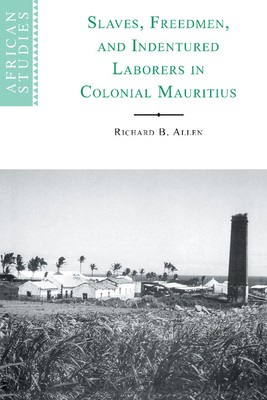
- We will send in 10–14 business days.
- Author: Richard B Allen
- Publisher: Cambridge University Press
- ISBN-10: 052164125X
- ISBN-13: 9780521641258
- Format: 15.2 x 22.9 x 1.8 cm, hardcover
- Language: English
- SAVE -10% with code: EXTRA
Slaves, Freedmen and Indentured Laborers in Colonial Mauritius (e-book) (used book) | bookbook.eu
Reviews
Description
This social and economic history of the island of Mauritius, from French colonization in 1721 to the beginnings of modern political life in the mid-1930s, emphasizes the importance of domestic capital formation, particularly in the sugar industry. Describing changing relationships among different elements in the society, slave, free and maroon, and East Indian indentured populations, it shows how these were conditioned by demographic changes, world markets, and local institutions. It brings the Mauritian case to the attention of scholars engaged in the comparative study of slavery and plantation systems.
EXTRA 10 % discount with code: EXTRA
The promotion ends in 18d.21:13:39
The discount code is valid when purchasing from 10 €. Discounts do not stack.
- Author: Richard B Allen
- Publisher: Cambridge University Press
- ISBN-10: 052164125X
- ISBN-13: 9780521641258
- Format: 15.2 x 22.9 x 1.8 cm, hardcover
- Language: English English
This social and economic history of the island of Mauritius, from French colonization in 1721 to the beginnings of modern political life in the mid-1930s, emphasizes the importance of domestic capital formation, particularly in the sugar industry. Describing changing relationships among different elements in the society, slave, free and maroon, and East Indian indentured populations, it shows how these were conditioned by demographic changes, world markets, and local institutions. It brings the Mauritian case to the attention of scholars engaged in the comparative study of slavery and plantation systems.


Reviews